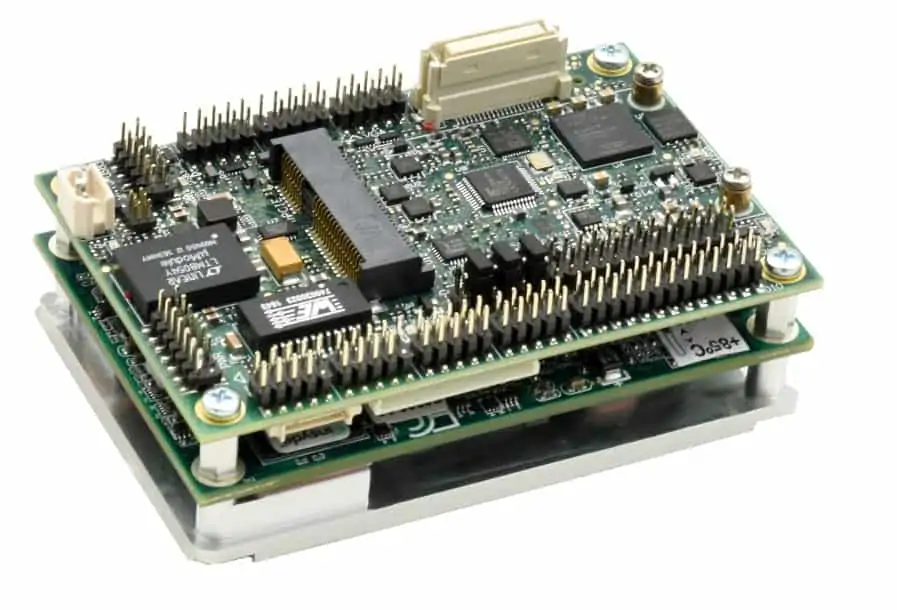Diamond Systems Corporation, a provider of rugged embedded computing solutions, has announced that it has unveiled its new ultra-small COM-based ZETA single board computer family. Highlights of the Zeta family include interchangeable COM Express COMs for scalability and long product life, ultra-compact size, and a high level of I/O, including a complete high-quality analog and digital data acquisition subsystem.
Designed in the COM Express Mini Type 10 form factor (84 x 55mm / 3.3 x 2.2in), the Zeta family offers performance scalability due to its use of COM Express CPU modules. Three processor options are currently available:
- Intel “Bay Trail” E3825 dual-core 1.33GHz CPU with soldered 2GB RAM
- Intel “Apollo Lake” E3940 quad core 1.60GHz CPU with soldered 4GB RAM
- Intel “Apollo Lake” N4200 quad core 1.1GHz (burstable to 2.5GHz) CPU with soldered 8GB RAM
The use of interchangeable CPU modules in the COM Express Mini Type 10 format enables Zeta to serve applications across a wide spectrum of price and performance needs. It also offers customers the longest possible product lifetime by vastly simplifying migration to a new CPU when the current one reaches its end of life. Zeta is an ideal choice for embedded applications with expected lifetimes of 10 or more years, including military unmanned aerial vehicles (UAVs) and other unmanned systems.
Find suppliers of Embedded Computing >
Zeta’s two-board COM + baseboard construction yields the a high feature density for its footprint. The COM provides the core CPU functions, while the baseboard provides the “final inch” for all the system I/O plus the data acquisition subsystem, power supplies, and expansion sockets. Zeta provides as much as a 60% reduction in size compared to boards in larger form factors offering the same level of I/O.
Zeta’s I/O list includes the following:
- VGA display and Single-Channel LVDS port
- Dual Gigabit Ethernet
- 4 USB 2.0 Ports + 1 USB 3.0 port
- 4 RS-232/422/485 ports with software-programmable protocol and termination
- 16 digital IlO lines
- Optional complete analog and digital data acquisition system
- Integrated wide-range 6 to 36V power input circuit
Zeta is available in two I/O configurations, digital I/O only or digital + analog I/O. The DIO only circuit offers 16 DIO lines with selectable 3.3V/5V logic levels. The full circuit includes 16 channels of 16-bit A/D, 4 channels of 16-bit D/A, 27 digital I/O lines with selectable 3.3V/5V logic levels, and 8 32-bit counter/timers, all supported by Diamond’s free, industry-leading Universal Driver data acquisition programming library. An interactive graphical control panel for Windows and Linux is also provided to control all data acquisition features.
Zeta offers multiple options for system expansion and mass storage. It includes a PCIe Minicard / mSATA socket and a micro-SD socket. A unique expansion connector enables the installation of a daughterboard that contains an M.2 SATA SSD socket, a second PCIe Minicard socket, HD audio, and 16 additional GPIO lines.
Zeta’s built-in heat spreader efficiently removes heat from the SBC to keep the processor and all internal electronics cooler for improved reliability. The bottom-side mounting configuration of the heat spreader provides a secure and convenient mounting system for the board. It also simplifies the installation of I/O expansion modules by eliminating interference or airflow problems that can occur with traditional heat sinks. All three models of Zeta are tested for operation over the full industrial temperature range of -40°C to +85°C, making Zeta an ideal choice for vehicle applications.
Six models are currently offered, based on various combinations of CPU and baseboard. Complete development kits consisting of the selected CPU, a flashdisk with either Windows 10 or Linux OS installed, and a cable kit are also available to accelerate development efforts.



















